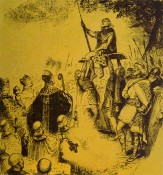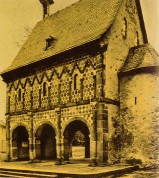
|
The coronation of Pepin the Short as king of the Franks
Pepin was crowned by the ope and became official defender of the papacy against the Lombards

|
The coronation of Pepin the Short as king of the Franks
Pepin was crowned by the ope and became official defender of the papacy against the Lombards
Charles Martel ruled the kingdom of the Franks for twenty-five years, but he never attempted to resolve the basic “legal” right to the crown. (The powerless Merovingian monarch, and not Charles, was sanctioned by Rome.) He might have seen an opportunity to resolve the question when Rome showed a keen interest in securing protection against threatening Lombard rulers, but Charles repeatedly ignored the requests.
His sons, however, displayed a different attitude. The pious Carloman convened the Council of Estinnes and secured the restoration of church lands which his father had confiscated. Carloman had more liking for meditation than politics, and after six years of rule he retired to a monastery. His successor was his brother Pepin (known as Pepin the Short).
Pepin continued Carloman’s policy to ward the church. He deposed Childeric III, the last of the Merovingian kings, and received the crown and ecclesiastical recognition. In seeking the approval of the church for his action, Pepin inaugurated a new concept, the “rule by the grace of God,” which was to have a pervasive effect on later European history. After further diplomacy, Pepin managed to obtain the sanction of the pope.
The year after Rome had sanctioned Pepin’s rule (752), the pope travelled to the Frankish court to request military help in repulsing the Lombards. In the Carolingian palace at Ponthion a complex arrangement was made. Basically, the pope made Pepin a Patricius Romanorum, a patrician of Rome, in exchange for a pledge of military assistance. In addition, Pepin promised to donate to the church all lands he seized in the area. This promise came to be known as the “Donation of Pepin” and led to the eventual creation of the Papal States.

|
a view of the abbey at Lorsch, Germany,
a classic example of eighth century architecture